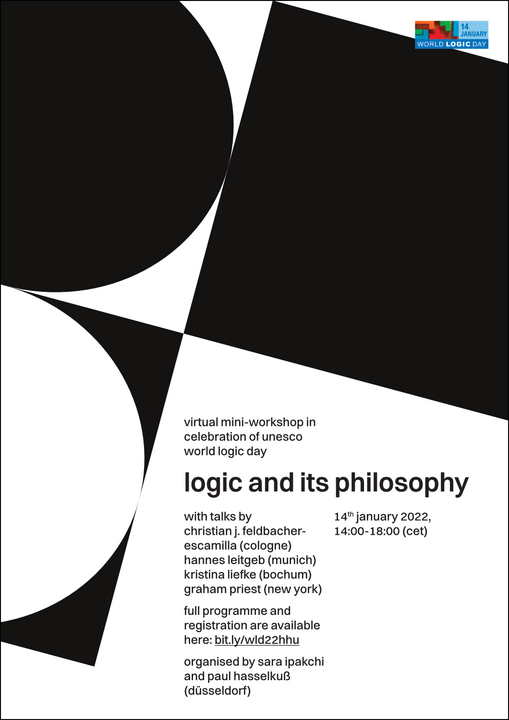On occasion of the UNESCO World Logic Day, a virtual mini-workshop on topics in logic and the philosophy of logic will be held on 14th January 2022 from 14:00 to 18:00 (CET). The event is organised by Sara Ipakchi and Paul Hasselkuß (HHU Düsseldorf).
Talks
Christian J. Feldbacher-Escamilla (Cologne): Suppositional Reasoning – Its Logic and Causal Structure
This talk is based on joint work with Alexander Gebharter. Suppositions can be distinguished in indicative vs. subjunctive and full vs. partial. In this paper, we propose a causal account of suppositional reasoning that naturally unifies reasoning based on all four kinds of suppositions. We also show how the rather heterogeneous update rules typically used for suppositional reasoning fall out from a single causal structure.
Hannes Leitgeb (MCMP, Munich): On the Logic of Vector Space Models
This talk will introduce a logical system in which formulas represent "effects" (e.g. of argumentation), such that these "effects" correspond formally to vectors. In a slogan: content is a vector. The logic involves a deductive system, a semantics with an appropriate notion of logical consequence, and extensions to similarity, inductive logic, and belief revision. The resulting system may be interpreted in probabilistic terms, and it can be applied to logically reconstruct some well-known problems and methods from cognitive psychology, computational linguistics, and machine learning.
Kristina Liefke (RUB, Bochum): Relating Intensional Semantic Theories: Established methods and surprising results
Formal semantics comprises a plethora of theories that assume different ontological primitives (e.g. individuals, possible worlds, situations, propositions, individual concepts). The relations between these primitives are, today, still largely unexplored. In particular, it is an open question whether the ontologies of some theories can be reduced to the ontologies of other, ontologically more parsimonious, theories. My talk answers these questions for a proper subset of formal semantic theories that are designed for the interpretation of doxastic attitude reports.
Graham Priest (Graduate Center, City University of New York): Making Sense of Absences
There is good reason to suppose that there are absences. For example, it would appear that they can be seen. But the supposition that there are absences faces both metaphysical and epistemological problems. This talk will deploy the tools of formal mereology to show how these problems can be solved.
Participation
The workshop will take place virtually via ZOOM. Participation is free of charge; those interested are asked to register in advance using this form.
If you have any questions, please write to Paul Hasselkuß or Sara Ipakchi.


